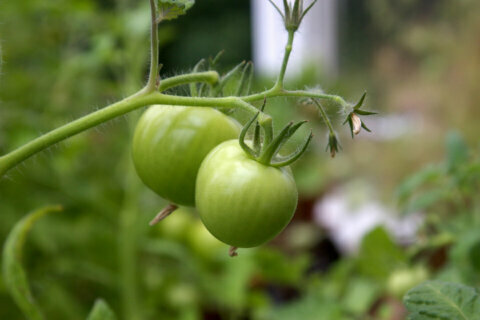Meet Mike THIS WEEKEND in Chantilly! Mike will be speaking on Saturday, Feb. 23 and Sunday, Feb. 24 at the Capital Home & Remodel Show at the Dulles Expo Center in Chantilly, Virginia. He’ll appear on Saturday at 4 p.m. (grow great tomatoes) and 6 p.m. (easy organic lawn care). On Sunday, he’ll appear at noon (grow up and build some raised beds!) and 2 p.m. (the perfect plan for summer plants). He hopes to see you there!
Gardening on a slope
Matt in D.C. writes: “I’m considering a home purchase. The home I like has about 6 to 8 feet of level ground, leading to a slope. (That part of the backyard is essentially a downhill walk to the back gate). Will I be able to install a square-foot garden on a hill? Should I avoid the bottom in case water settles there?”
You should definitely avoid the bottom, Matt. It’s likely to be a wet area, and frost will settle there. Depending on the width of the flat area, you should be able to install a good number of 4 to 6 foot-wide raised beds. If you want to use the slope, look at designs for terraced garden beds, an ancient technique that looks — and works — great!
An easy solution for dying shrubs
Brad writes: “I bought a house in Gaithersburg last September after living in Annapolis for decades (although my gardening heart is in San Diego). One particular shrub in front of the house started turning brown shortly after I moved in. Despite my pruning it back, the problem continues to affect neighboring branches and other plants of same variety. I’m wondering if you can suggest a nontoxic solution.”
I sure can, Brad: Rip them all out and replant the area with something you like; ask your local independent garden center for suggestions. There’s no reason to try and keep sick plants — especially when you didn’t pick them. (Maybe they’re diseased; maybe the sellers dumped them in fast for some curb appeal; who knows?)
Again: no reason to be stuck with other people choices. Be bold!
Compost now or later?
Tim in Fredericksburg writes: “Can I get a load of compost and spread it over my flower beds now or should I wait until spring arrives? Does timing make a difference?”
Yes, Tim. If you spread it now (provided you can; it might be frozen), it would lose nutrients from rain and snow. Better to get samples of what’s available and test them now to make sure the material is good. Here’s how:
Fill two flower pots with the compost in question. Plant the freshest seeds you have in one; plant nothing in the other. Keep them both watered and in a warm place. If the naked pot stays naked, the compost is weed-free; if the new plants look healthy in the other pot, the compost is free of herbicide residues.
BUT if the ‘empty’ pot sprouts weeds and/or the fresh seedlings look weak or off-color, take a pass on that compost.
Pressure treated wood a bigger danger to YOU than plants
Ilona, in Northern Virginia, right near the Potomac writes: “Do you have any suggestions for gardening downhill of a pressure treated wooden deck? I dream of growing shade friendly veggies and herbs in our town house yard but am concerned about the chemicals in the deck that may be seeping into the soil. Or should I wait for a year or two, when we’ll have to replace the deck floor? (It’s 20 years old.)”
The danger from old “CCA” pressure treated wood is in the arsenic content — and it’s a danger to humans, not plants. Every time you touch the wood with bare hands or feet, you absorb some of the arsenic. It’s especially dangerous to children — so let’s get it replaced ASAP.
Don’t delay that replacement, Ilona. If the wood is CCA — chromated copper arsenate — you’re absorbing arsenic every time you walk on it in bare feet or put your hand down on the railings. Replace the floor with Trex or another composite material that’s safely inert. And then stain or paint the rest of the wood to seal in the arsenic.
Then, build the raised beds for your herbs. Lay down a solid sheet of cardboard to isolate the old soil, build your beds on top of the cardboard and fill them with fresh compost and topsoil — none of your own dirt.
And be sure to wear gloves whenever you work in that old soil.







